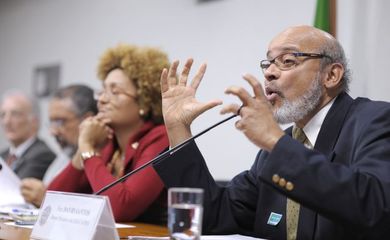Unifesp students create project to teach Portuguese to refugees

Portuguese undergraduate students created the project Refugees' Digital Memorial, referred to as MemoRef, which promotes the integration of refugees through Portuguese language classes and cultural activities. In August, when the course began, foreigners had a chance to watch and enjoy a samba performance.

One of the creators, student Marina Reinoldes, 20, said that, at the end of the course, slated for December, a database will be available on the internet showing the fruits of this pedagogical and social experience, in addition to the refugees' history.

Project Refugees' Digital Memorial promotes the integration of refugees through Portuguese language classes and cultural activities
Being a refugee is not a choice, the student stressed. “We're fully aware that they don't have have a choice. But we do. And this power of choice is what motivated us to make this social project and help them,” she stated. She explained that universities have the social mission of helping, developing, and changing their surroundings, going beyond the theory and applying their knowledge to the local community.
In a questionnaire presented to the foreigner applicants, MemoRef members ask them why they came to Brazil. “One of the students answered 'because I need to live and work.' That showed me that the value of our project goes beyond educational. It's a social issue, that of being able to bring the university into this reality as well,” Marina says.
Altogether, seven students at the Federal University of São Paulo (Unifesp), from the campus in Guarulhos, take turns teaching on a weekly basis 20 refugees, including Syrians, Cameroonians, and Nigerians, Marina had past experience teaching refugees at the NGO Oásis Solidário, and was able to see the difficulties facing the foreigners in Brazil as soon as they arrived, with no proficiency in the language, no employment, and often alone.
Since last year, Syrians have been atop the list of refugees in Brazil. According to data from the National Committee for Refugees (Conare), an agency linked to the Ministry of Justice, 2,077 Syrians were granted asylum by the Brazilian government from 2011 up to August this year. They are followed by Angolans (1,480), Colombians (1,093), the Congolese (844), and the Lebanese (389).
Faced with this situation, Marina conceived the idea for the MemoRef project within the academic environment, where she managed to bring together everything she needed to implement the initiative: physical space, equipment, advising professors as well as undergraduate volunteers who were willing to work and available. Her team also put together a textbook entitled Recomeçar: língua e cultura brasileira para refugiados (A New Beginning: Language and Brazilian Culture for Refugees, in a rough English translation), to be available for download later this month free of charge.
Cameroonian Luc, 45, has been in Brazil for eight months. His family, who live in the US, paid him a ship ticket so he could visit them. The ship, however, stopped in Argentina and then again in Brazil, in Rio de Janeiro, where Luc landed. From Rio, he ended up in the city of Guarulhos, São Paulo, where he has a friend who gives him assistance. He has not been able to find a job so far, but he has already applied for asylum in Brazil and plans to attend a welding course. His livelihood here depends on his friend and an amount of money sent by his family from the US. Luc speaks French and English, and now understands some Portuguese, but he is interested in improving his skills in the language, so he looked for Cáritas, where he was advised to seek MemoRef. “It's really excellent; I really like it,” Luc said.
In Marina's view, the group shares a sense of fulfillment for having conceived the project and taken it out of the page. “I think we learn a lot more than we teach.”
Translated by Fabrício Ferreira
Fonte: Unifesp students create project to teach Portuguese to refugees




Dê sua opinião sobre a qualidade do conteúdo que você acessou.
Escolha sua manifestação em apenas um clique.
Você será direcionado(a) para o sistema Fala.BR, mas é com a EBC que estará dialogando. O Fala.BR é uma plataforma de comunicação da sociedade com a administração pública, por meio das Ouvidorias.
Sua opinião ajuda a EBC a melhorar os serviços e conteúdos ofertados ao cidadão. Por isso, não se esqueça de incluir na sua mensagem o link do conteúdo alvo de sua manifestação.
Clique aqui para mais informações sobre a Ouvidoria da EBC.










